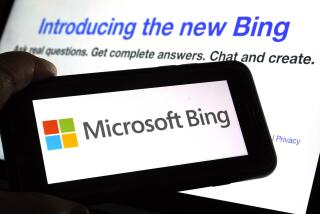Bing gets foothold in China market
- Share via
BEIJING AND LOS ANGELES — Microsoft Corp. is looking to capitalize on one of rival Google Inc.’s biggest areas of weakness: China.
The Redmond, Wash., software giant has signed a deal with China’s dominant Internet search engine, Baidu, to provide Baidu users with the ability to search the Web in English.
The pact comes more than a year after Google pulled out of China, partly to protest the Chinese government’s strict online censorship policies. Google’s exit may have created an opportunity for Microsoft, which has long-standing ties with China, analysts said.
At this point, “it’d be hard for Baidu to partner with Google, given Google’s issues with the government there,” said Aaron Kessler, an analyst at ThinkEquity. “Baidu would view Google more as a competitor, and Microsoft more as a partner.”
Baidu, which commands 83% of the search market in China, is closely aligned with the Chinese government.
But Baidu has long struggled to match Google’s English-language search capabilities and has expressed interest in starting its own search business in the U.S. and other countries outside China. The deal may be a preliminary step in that direction, analysts said.
For Microsoft, the pact with Baidu would give its Bing search engine a foothold in the world’s fastest-growing Internet market. Bing now accounts for less than half a percent of the search business in China, while Google accounts for about 20%, according to Analysys International, a Beijing-based Web consulting group.
Baidu plans to incorporate Bing’s English search results by the end of the year. But the Baidu-Bing search engine will have to adhere to the country’s ever-expanding censorship rules.
“We are subject to all applicable laws and regulations, as we are in every country where Microsoft does business,” a Microsoft spokeswoman wrote in an email. “As part of this partnership, Bing will incorporate certain filtering technologies and processes to ensure that we are in compliance with local laws.”
Kaiser Kuo, a Baidu spokesman, said the deal could also make Baidu more competitive in search markets outside China.
“It’s a non-trivial matter to build your own index of English pages, so why not partner with someone who already does that well?” Kuo said. “We’ll learn quite a bit. And that certainly will help us venture into other markets with our core search product.”
Edward Yu, head of Beijing-based Analysys, said Microsoft was more adept at navigating Chinese politics than Google. “Given the length of its operations in China, Microsoft is very familiar with how to keep a good relationship with the Chinese government,” he said. “They’re much more experienced than Google, and they’re much more skillful than Google in this regard.”
Historically, Microsoft has had better relations with China than Google. In 2006, when Chinese President Hu Jintao made his first state visit to the U.S., he stopped in Seattle to visit businesses in Washington state as well as to have dinner at the home of Microsoft founder Bill Gates. That visit was coordinated by Gary Locke, the former governor of Washington and currently the secretary of Commerce. He has been nominated to become the U.S. ambassador to China.
Microsoft declined to say whether Locke participated in the Baidu deal.
--
david.sarno@latimes.com






